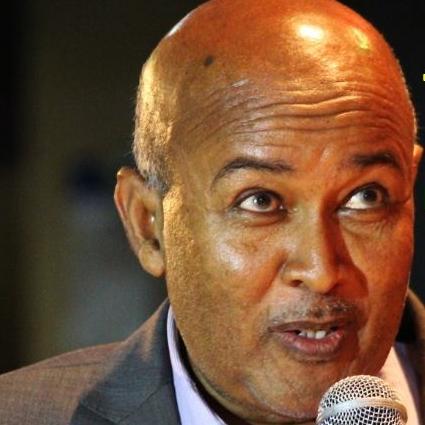Abdirahman Mohamed Abdullahi “Irro”, presidential candidate for Waddani political party, grudgingly conceded defeat stating that he abdicated rightful claim to victory for peace, unity, and stability in Somaliland.
Mr. Abdirahman, concluding a long and fervently debated discussion with his top lieutenants in the party, repeated his and his party’s grievances against the National Electoral Commission, processes and procedures of polling, and, generally, what he termed as ‘widespread rigging in the elections in favor of the ruling party, Kulmiye, in a more detailed manner.
Mr. Irro came back to the envisaged allegations of his party time and again in a sort of manner that hammered them into one’s psyche whether he agreed with or not: rigging, supporters denied of their rights, Waddani winning but denied of rightful claim, heavy-handedness in all sorts of ways on the part of NEC, and so on. He pledged support for NEC results, reneged, came back again and again bolted only the evenng before always maintaining that he was the rightful winner of the race.
“Today,” he said “I have decided to take a decision that will certainly not please supporters  whose votes had been pillaged and usurped but to preserve the peace and unity of Somaliland ‘.
whose votes had been pillaged and usurped but to preserve the peace and unity of Somaliland ‘.
“I have taken this most unpalatable, most acerbic decision not to concede defeat to Musa Behi. I did not abdicate for Kulmiye,” he stated. “I waived (rightful claim) for the sake of Somaliland stability, co-existence (of its people) and for national unity”.
Mr. Abdirahman’s voice, words and coldly calculated turns of phrases appeared to have been designed to produce the opposite effect of the reasons he cited for the compromise he and his party reached. They left one with a growing feeling of anger, bitterness and a militancy that defied acceptance of power changing hands not in Waddani’s favor.
Political analysts explain that Mr. Irro wriggled out of an uncompromising situation as best as he could, and that the tone and words he used were meant to, primarily, assuage the militant stance of many of his more recent join-ons such as Ismail Yare, Abib Timacad, Hussein Aideed, Mohamed Behi and arrivals from the Diaspora who contributed both financially and physically to the impressive support Waddani drummed up in such a short time without prior experience.
As reluctant and ‘ungraceful’ as the concession to defeat may have appeared, the fact that the Waddani chairman said he and his party would accept the results as much as they loathed them, nonetheless, was an end that the whole of Somaliland welcomed with a sigh of relief.
Both international and domestic observers’ statements, however, starkly contradict Chairman Irro’s allegations of mass scale fraud and rigging in the 13 November elections.
“Observers praised the smooth and peaceful conduct of voting and, despite areas of concern, concluded that irregularities were not on a scale such that they would undermine the integrity of the electoral process,” international observers in all of the statements released since the election.
Domestic observers were not any less forthcoming in their estimation of the polling process and election day activities.
“The presidential election held on 13 November 2017 was peaceful and smooth administratively, at the same time the presidential election was free when it comes to NEC compliance of the laws and regulations laid for the presidential election,” the non-state actors’ press release said.
Musa Behi Abdi won by 55% of valid votes cast, where Waddani clinched an impressive second-place but short of Kulmiye’s final tally by 15%. – about 80 000 votes short of that of Kulmiye.
Mr. Behi will take over the presidency of the Republic of Somaliland within a month, becoming the third elected on a one-man, one vote democratic exercise and the fifth since 1991 when Somaliland reclaimed an independence it lost to an ill-fated union with Somalia in 1960 in pursuit of a dream called ‘Greater Somalia’.



























